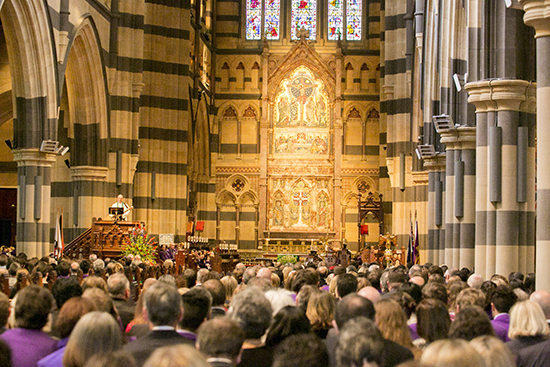
This time next year, the College will be well and truly into its sesquicentennial celebrations. Indeed 2016, to state the obvious, will be a milestone year and a time to reflect on Wesley’s journey of one hundred and fifty years. Over the decades, each generation has contributed something to the story of Wesley College and the routine of activities and events that we as a community follow.
Many of these activities have now become formal traditions of the College and it would be hard to imagine life at Wesley without the annual Commencement and Valedictory Services, ANZAC and Remembrance commemorations, distribution of colours, giving of Song Books and Gift Books, Public Questions Society, musicals and theatrical productions and much more… In essence, what we see as a normal school activity is, in reality, part of our tradition and the fabric of life at Wesley.
Sometimes College traditions are expressed with a slight variation at each campus. Each of our campuses and sites is a community in itself and together they form the whole - Wesley College. As would be expected they have their own traditions and rituals. Glen Waverley, for instance, stages the much anticipated annual teddy bear’s picnic, bringing together the Prep and Year 12 students. Elsternwick pays homage to its pre-Wesley heritage with all new students and staff receiving a Cato Star at assembly. St Kilda Road students proudly support the Catalina flying boat veterans at the annual Anzac Day parade. Parents organise a dinner (which selected staff attend) for Year 12 students (the Marathon Club) who started in The Hutch or Prep and are about to complete Year 12. The students, their parents and staff enjoy a dinner and presentation in the Great Space at the Junior School, the place where their Wesley journey started. And the final chapel for Year 12 students in fancy dress is a real highlight of the last days of school. The chaplain’s service and student singing of school songs are really worth hearing.
One of our greatest traditions is Speech Night. Recently I came across this report of a Speech Day (night) which was held on Friday 11 December 1925 in the Auditorium, Collins Street, Melbourne (the old concert hall, now the site of the new BHP building directly opposite the former Georges Department store). The Chronicle reported that it was a marvellous evening. In fact the special guest and Chairman was none other than Sir John Monash GCMG KCB LLD. His extraordinary and candid speech would have had great resonance today. Monash knew he was addressing a gathering of parents, friends and boys of Wesley. “He said that he wanted to utter a word of warning against the practice of choosing a special career for a boy in the early stage of his school life. Specialisation required concentration on a comparatively narrow field of effort, and did not always reach success. It was better that learning should be based upon a sound general education. He had often wondered whether the University and its requirements did not loom too largely in the life of the public schools. He understood that the schools had to give what the parents demanded, but he appealed to parents not to settle too soon upon careers for their boys… Character, imagination and culture counted more in life than did a special knowledge of the technique of a particular calling. Character, imagination and culture were acquired in school days. If they were missed then they could never be gained afterwards.”
In that audience was a senior boy, later prefect, by the name of Harold Holt. He had entered Wesley College in 1920 and left in 1926. The following year, he took the stage on Speech Day and participated in one of Wesley’s greatest Speech Night traditions - the singing of The Leaving Song. It fell upon Harold Holt to lead the singing which, of course, would eventually involve the entire audience as the boys filed out and bade farewell to their old school. Harold Holt would replace Sir Robert Menzies (OW1912) as Prime Minister of Australia in 1966-67. What a journey from prefect to prime minister!
Traditions connect us to our past and help to shape our present. Sometimes traditions are abandoned and sometimes they are inaugurated and even revived. Whatever the case, it is our traditions that help to understand the past, deal with the present and ponder the future.
